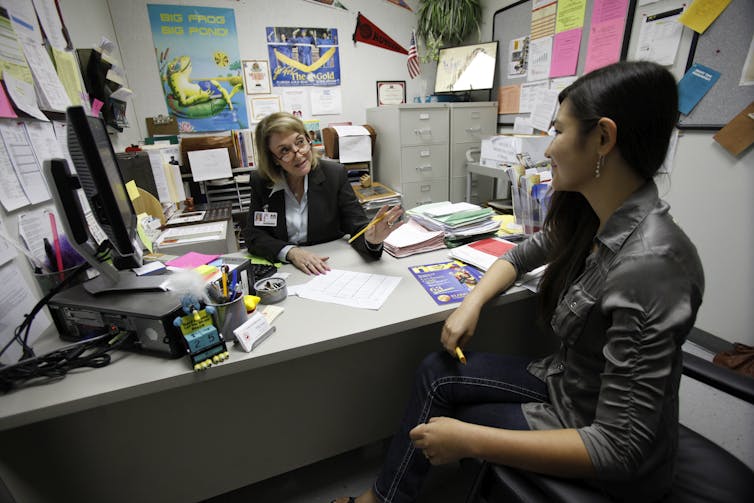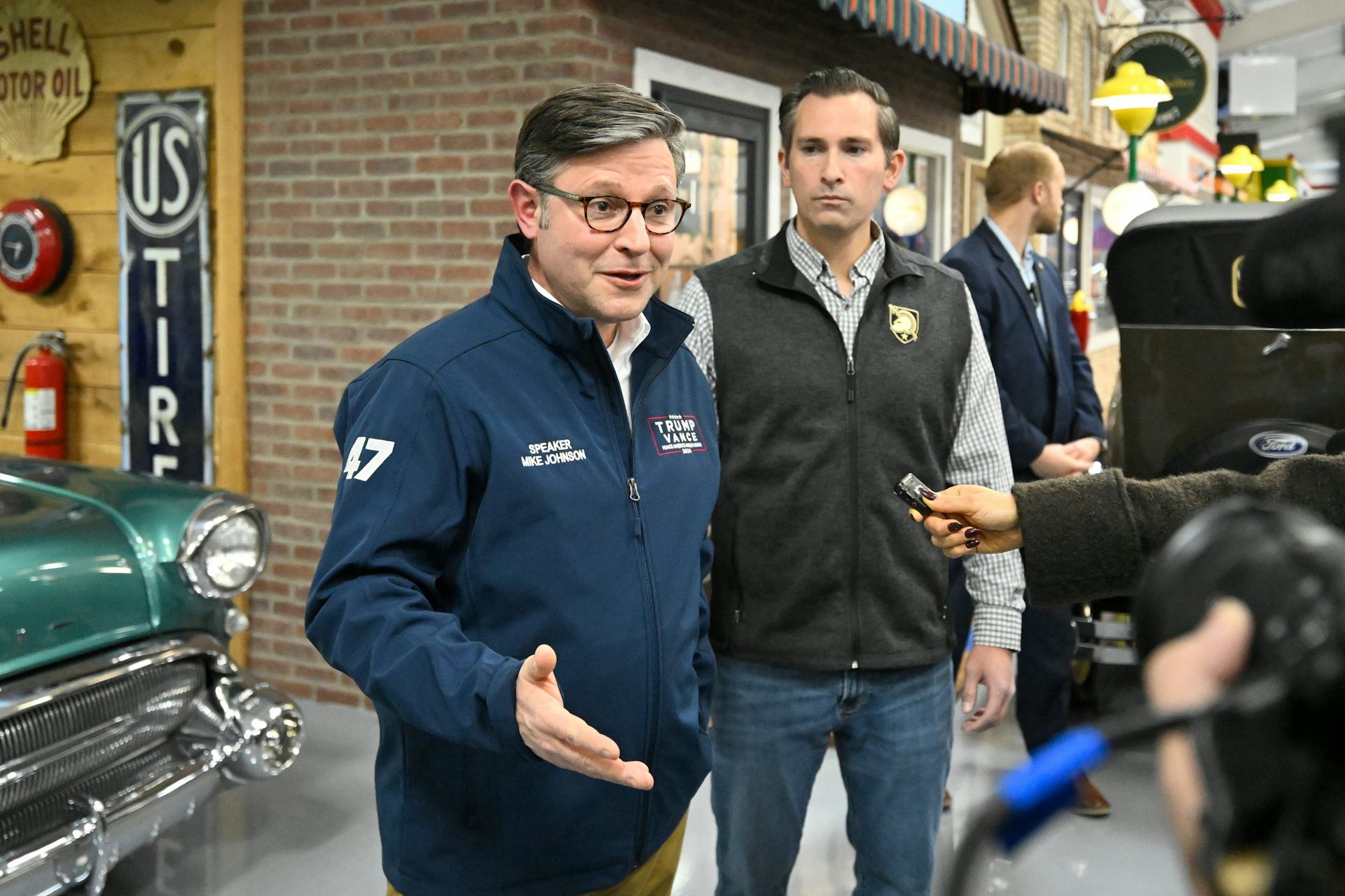Colleges’ career success stats don’t tell the whole story about how their graduates are doing after
Colleges point to certain statistics when they talk about where their graduates land. But what might they be leaving out? A career education specialist weighs in.

When high school students and their families investigate which college is the best fit, they will inevitably be inundated with various facts and figures. Brochures and websites might highlight the school’s dining halls or student-led clubs and activities. But one of the most important statistics for students and families to consider when choosing a college is the career outcomes of its graduates.
This is, perhaps, the greatest selling point for any institution of higher education. Students consistently say that finding a good-paying job is among the top reasons why they go to college.
As scholars of career education, we believe it’s important for students and families to know there may be more under the surface to those career outcome statistics.
Why career placement matters
What does “career success” even mean, and why should students or their parents care? How do colleges measure it? And most importantly, how are those statistics verified?
These are all questions that should be on the minds of prospective students and their families. It’s worth asking these questions during college visits.
Put simply, career success or career outcomes refer to a graduate’s employment or academic enrollment status within a period of time after graduating college. By industry standards, a graduate may achieve career success if they are employed or continuing their education within six months of graduation. So when we at Champlain College tout a 90% career success rate for our class of 2023, what we mean is that 90% of the class was either employed or continuing their education within six months of graduation.
Sounds good, right? But compared with what?
The National Association of Colleges and Employers releases annual reports with national career success outcomes. Their latest report, released in October 2024, showed that the national average for career success rates in the class of 2023 was nearly 85%. So, yes, it is good.
Critical to this career success rate, however, is another number – one that’s less discussed but also very telling. That’s the knowledge rate, or the percentage of graduates who shared their outcomes with their college after graduating and that the college can reasonably verify. Think of it this way: If a college boasts 100% career success for a graduating class, but their knowledge rate is only 50%, then that “100% career success” becomes a lot less impressive, as it represents only half the class.
All of these numbers are part of the First-Destination Survey, designed by the National Association of Colleges and Employers and distributed by more than 300 universities and colleges across the country, including Champlain College.
According to the organization’s most recent annual report, which reflects data collected from the class of 2023, the national knowledge rate for bachelor’s degree students was only 56%. That means that the national career success average of 85% reported by the class of 2023 represents just over half of all graduates.
That means that when it comes to the career success outcomes touted by any given college or university – even those that make annual “best of” rankings – it’s safe to assume that the numbers reflect only 56% of the institution’s students. Say a college reports a 90% career success rate of its 1,000 graduates, then we would expect 900 of those students to be employed or pursuing a further degree. But if the knowledge rate for that institution is 50%, then the college is claiming a very high level of overall success while having data for only half of its graduating class.

Data is public
Most colleges and universities release career success and knowledge rates to the public in annual reports. If you’re a prospective student considering a college, you can and should really delve into these statistics.
For example, if you look at some of the colleges on The Wall Street Journal’s best value list, you can see some low knowledge rates. Baruch College earned the top spot for best value, and the school’s success rate for the class of 2022 was 96%. However, its knowledge rate was only 49%.
Similarly, Bowdoin College reported for its class of 2022 a 92% career success rate, with a response rate of 35%.
That is not to say these schools are doing anything wrong. The point is that prospective students can educate themselves more on career success rates and corresponding knowledge rates.
Of course, knowledge rates also vary widely. Babson College, which ranked second on WSJ’s best colleges of 2025, reported an impressive career success rate of nearly 99%, with a knowledge rate of 83%. Davidson College reported a 91% career success rate for 2023, with a knowledge rate of 82%.
At Champlain College, where we serve as career coaches, our class of 2023 reported a career success rate of 90%, with a 81% knowledge rate.
Questions to ask
When prospective students are on college tours or interacting with admissions counselors, they should come prepared with probing questions regarding career success. Here are some questions that we think prospective students should ask college admissions counselors about the institution’s career success:
1. What is the process for tracking career success? You should learn the full process – how the school collects data and reports out on the statistics, and what trends, if any, the institution has noticed in its graduates’ career success over the years.
2. What is the school’s knowledge rate? If it’s low, it may be a reflection on either the institution’s career services or the quality of the overall student experience at that institution. If so, ask whether faculty are involved in the process to get a better idea of where the weakness lies.
3. When does the data collection process start and how long does it take? It should be an ongoing process, allowing for students to share career success both prior to and following graduation.
4. What kinds of additional questions did the school ask in its First-Destination Survey? Beyond relevant career information, is the institution asking about students’ internship experience? Did they study abroad? What other types of experiential learning or leadership opportunities did they undertake? What kind of advice do they have for prospective students? And, importantly, how do you verify student career success?
Equipped with these questions – and the understanding that career success rates are critical in the college selection process – students can feel more confident than they would otherwise that they have a good understanding of how well the institution prepares them for success after graduation.
Many schools publish their career outcomes directly on their website, but you can always speak with an admissions counselor to learn more.
The authors do not work for, consult, own shares in or receive funding from any company or organization that would benefit from this article, and have disclosed no relevant affiliations beyond their academic appointment.
Read These Next
Do special election results spell doom for Republicans in 2026?
Special election results have anticipated recent midterm outcomes. With Democrats now overperforming,…
The intensity and perfectionism that drive Olympic athletes also put them at high risk for eating di
Athletes in sports where weight and body image come into play, such as figure skating and wrestling,…
Are women board members risk averse or agents of innovation? It’s complicated, new research shows
The effect of women board members on patent activity hinges on whether the company is meeting performance…






